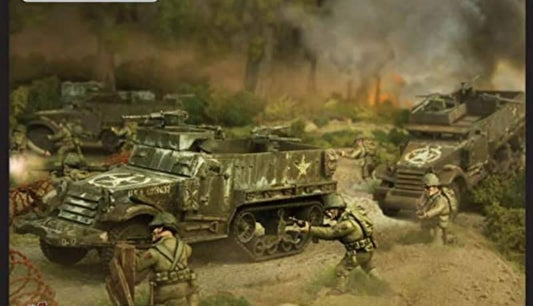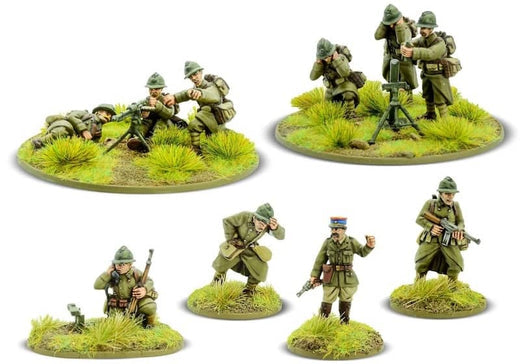If you have a friend who wants in on the fun, but has never played a military tabletop game before, you may need some advice on introducing this awesome world to them. It’s important to be patient and avoid making their first experience too overwhelming. Keep reading for tips and tricks on introducing military tabletop games to beginners.
Help them Prepare, Play a Demo Game, and Adapt Appropriately
A practical approach that I often try when introducing beginners to a military tabletop game involves a combination of visual learning and hands-on experience. A great rule of thumb that I follow for any type of tabletop game is to ask new players to watch a YouTube video or two before showing up. There are so many great channels, where they have great videos that are both enlightening and engaging, providing an initial grasp of the game's rules and mechanics. Most players usually don’t pick up after watching one video, but you can piggyback off from whatever they understood.
After explaining the rules very briefly and letting everyone ask any questions they have, we directly get to play a demo game. It’s always a great way to learn by seeing the rules in action. You can keep explaining the rules all day long, but that will only make people run away from playing the game. I tried this strategy when playing Dune with three new players, and everyone just loved playing and learning at the same time. Once everyone is confident that they know how to play, you can always start from scratch.
I also stress the importance of adaptability. Every learner is unique, and sometimes, customizing the learning experience can make a significant difference. For instance, always start with the simple version of the game rather than bringing in expansions or introducing challenging modes. To make sure you are not chasing people away, try to keep things light and enjoyable to promote a positive experience that motivates newcomers to delve deeper into this fascinating world.
Be a Good Guide, Start with Something Easy, Welcome Your Beginner, and Have Fun
Start with a beginner-friendly game. Military tabletop games can be complicated with complex rules. So, beginners can find it challenging. I advise you to choose games that are easy to learn and have simple rules. Some of the best games that come to mind are Warhammer 40,000, Kings of War, and A Song of Ice and Fire.
Give clear instructions
Please explain the war game rules to beginners clearly and concisely. I suggest using visual aids like diagrams or instructional videos to help beginners understand the game mechanics.
Allow for experimentation
The best way to learn to play any war game is to play it independently. Therefore, I recommend allowing beginners to experiment with their strategies and learn from experience. It helps them understand the game mechanics better and develop their unique play style.
Create a welcoming environment
War games can be confusing for beginners. Hence, they might have many doubts. Please create a welcoming environment for beginners by encouraging them to ask questions. Ask them to provide feedback based on their experiences.
Have great fun
The objective of playing a military tabletop game is to have fun. Therefore, you must keep the atmosphere light-hearted and enjoyable. It will encourage more people to get involved and have great fun.
5 Ways to Tailor a Military Tabletop Game for Beginners
1. Remove some of the complexity for the first few games
Tabletop games have a tendency to have some very complex rule interactions. If at all possible, try and remove a layer or two of rules in the beginning. When you are still unsure how movement works, there is no reason to have the mental load of how a particular unit's special rules work in combat.
2. Know the rules before you try to explain them
This is something that applies to any complex game, but it is really key. In order to teach a game, it is much easier if you know the rules inside and out. When the beginner asks a question, it is important that you can either quickly explain how the rule works or just say I am not quite sure, but for this game let us play it this way and we can look it up after the game is over. There is nothing worse than learning a game by sitting idle and watching someone flip through a rulebook.
3. If the narrative is something the beginner enjoys, lean heavily into it
Some people really enjoy the narrative or historical aspect of games. If you think the beginner enjoys that kind of stuff, try and use that as an advantage in teaching the game. That means using the flavor when explaining the rules and when setting up the game. They will have a much easier time learning the rules if they can key it off narrative or historical things they already understand.
4. Shorten the game
Tabletop military games can be long. You want the first experience to be sweet and to the point, and not drag out forever. If this is a game that normally takes +2 hours, I would advise doing something to shorten it. Either only play half a game or cut down on the model count for the intro game. If you play with less stuff on the board, it also helps with the mental load of the new player.
5. Even the playing field
Sometimes things are not fair. But there is nothing worse than playing a game for the first time and feeling like you did not stand a chance. Make sure the two armies or warbands are a good match and will make for a good game. And remember: this is not a competitive game. The goal here is for the other person to learn the rules AND be keen to try again. If you just plow through him, he might have learned the rules but there is a good chance he is not coming back for more.
Use Sensory Elements
The use of sensory elements is definitely an original strategy. It can be effective to completely immerse new players in the game's world through sensory experiences. For outdoor battles, this might entail using scents like new grass or sound effects to simulate distant cannon fire.
You can make an experience more immersive and memorable by appealing to multiple senses. With this strategy, the game is not only easier to understand for new players but also more engaging and intriguing, making a lasting impression.
The sensory component gives the introduction of military tabletop games a special layer, making it a creative and highly successful approach for attracting newcomers to the gaming industry.
This is a crowdsourced article. Contributors' statements do not necessarily reflect the opinion of this website, other people, businesses, or other contributors.







